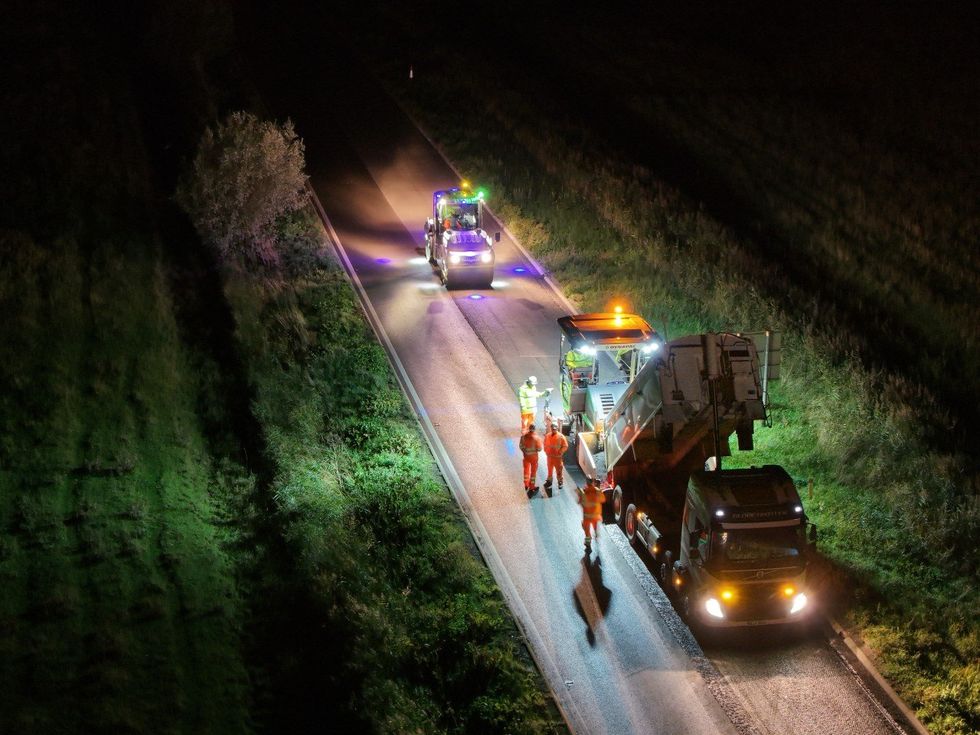Drivers set to benefit from revolutionary green road project across popular region - 'Ideal opportunity'

The project in East Anglia uses 90 per cent recycled material to create the new road
Don't Miss
Most Read
A major road resurfacing project in East Anglia has demonstrated how sustainable construction methods could transform England's highways.
The trial on the A47 connecting Acle and Great Yarmouth achieved carbon savings of 400 tonnes through innovative use of recycled materials and electric equipment.
The groundbreaking scheme incorporated more than 90 per cent recycled content in the road's structural layer, dramatically exceeding conventional pavement construction, which typically contains far lower proportions of reclaimed asphalt.
This carbon reduction was equivalent to the same amount of energy needed to supply 142 typical homes for an entire year.
National Highways, responsible for resurfacing more than 1,200 lane miles annually, commissioned contractors Heidelberg Materials and WSP to deliver the project using low-carbon methods.
The initiative represents a significant advancement towards achieving carbon-neutral highways across the national road network.
The project employed an innovative Cold Recycling Bound Material technique, transforming existing road surfaces into sustainable paving material.
This process involves crushing old asphalt and concrete into aggregate, then combining it with air and water to create foamed bitumen that delivers durability and weather resistance while offering an eco-friendly alternative to conventional construction materials.

The project uses 90 per cent recycled materials to complete the pavement
|NATIONAL HIGHWAYS
Strategic positioning of a low-carbon recycling facility just eight miles from the construction site proved crucial to minimising emissions.
This proximity represented a 16-mile reduction compared to traditional asphalt supply plants, significantly cutting transport-related carbon output.
The original specification would have limited recycled content to merely 10 per cent.
But through this revolutionary approach, the project recycled 2,400 tonnes of tar-bound material that would otherwise require disposal at specialist landfill facilities, while incorporating over 137,000 tonnes of recycled materials overall.
Alice Grandidge, Project manager at National Highways, said: "We know that good quality roads are important to the millions of drivers who use our network each day.
"This scheme presented the ideal opportunity to resurface a road effectively but in a low carbon way - from the materials we use, where we sourced it from, how we mixed it and when we work on it."
LATEST DEVELOPMENTS

Work took place overnight to minimise disruptions for drivers
| GETTYScott Cooper, Managing Director of Contracting at Heidelberg Materials UK, praised the collaborative effort, stating that the scheme is a "great example of the effectiveness of supply chain collaboration in driving carbon reduction measures".
Dermott Doyle, Technical Director at WSP, added: "On the A47 project, we worked closely with National Highways and Heidelberg Materials to design a major pavement intervention that maximises recycled content and reduces carbon emissions."
The construction phase utilised cutting-edge electric machinery, including pavers and rollers, alongside hydrogen-powered low loaders for material transport.
All operations took place during overnight hours to minimise disruption to road users, with work commencing in May and concluding this month.
The A47 Acle Straight proved particularly suitable for this carbon exemplar project due to the East Anglian region's scarcity of appropriate aggregates for conventional asphalt production.
Traditional methods would have necessitated importing substantial quantities of aggregate from remote locations, generating considerable carbon emissions through increased heavy goods vehicle movements.

The A47 was resurfaced between May and October
|GETTY
The innovative evoBuild Foamed Asphalt process enabled the recycled layer to receive a surface course and reopen to traffic within a single night shift, demonstrating both environmental benefits and operational efficiency.
National Highways has established a Low Carbon Demonstrator Fund to support proven products in becoming standard options for resurfacing projects.
The fund enables schemes nationwide to adopt emerging low-carbon technologies, assisting suppliers in transitioning these innovations into regular business practice.
Ms Grandidge acknowledged certain limitations, noting that traffic volumes determine appropriate surface types.
She explained that busier routes, such as the A1, might not suit this particular surface treatment.
However, she stressed the broader applicability of lessons learned: "Many lessons can be learnt from this that can be replicated in some other areas across the country.
"It is an example of how we need to adapt to meet carbon zero targets and work in a greener way."











